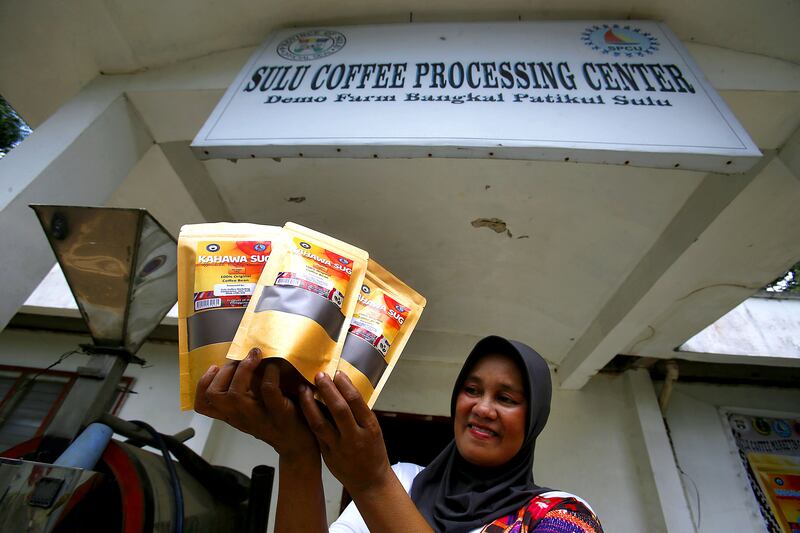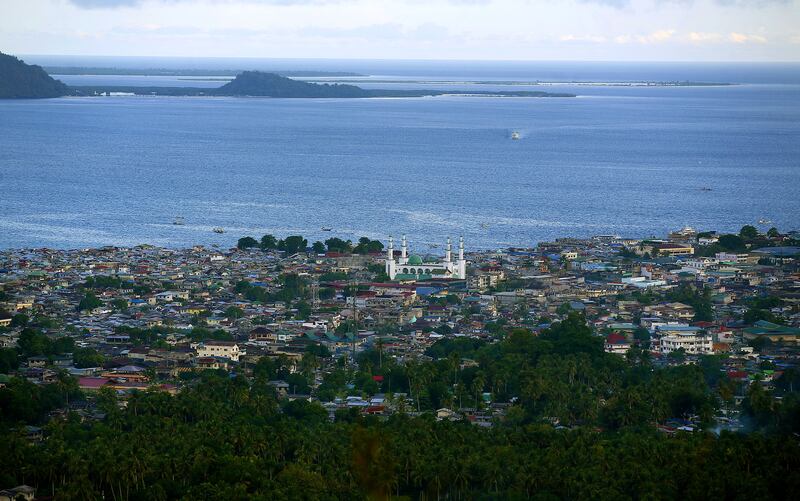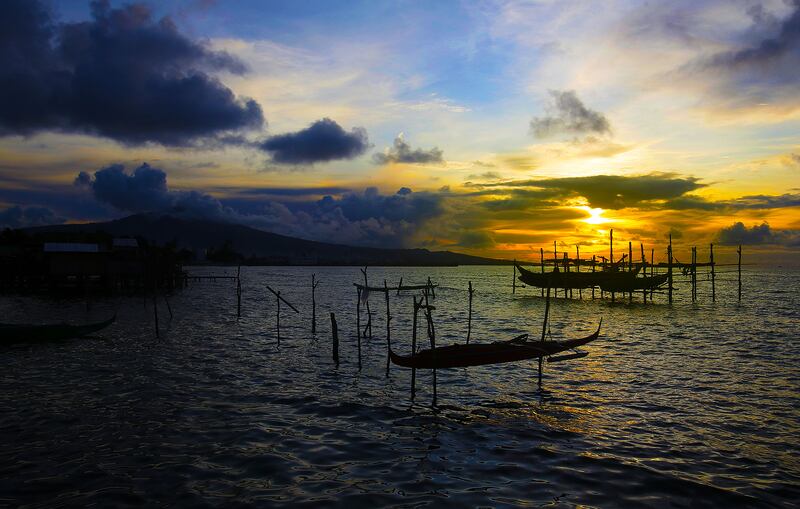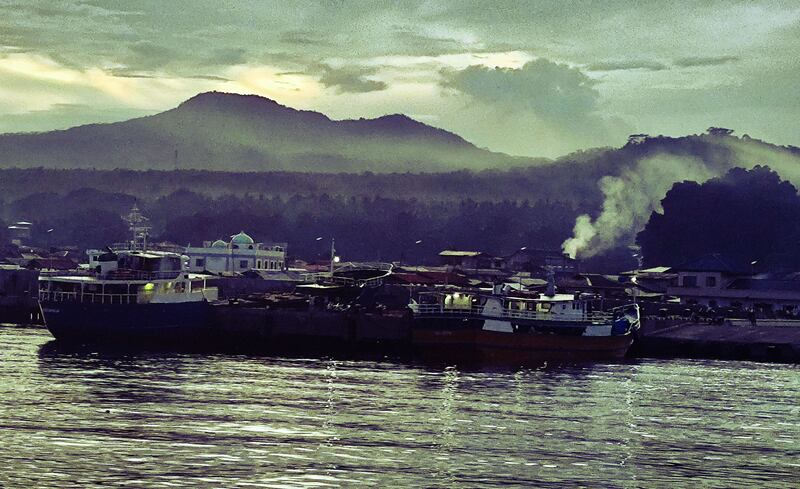With a machete slung around his waist, Muamar Julani was planting coffee in a small field near his home surrounded by coconut trees.
The 24-year-old is among former members of the Abu Sayyaf militant group in Jolo, an island in the far southern Philippines, who’ve traded in their weapons for farming tools as part of a government-sponsored rehabilitation program. He and other ex-militants are hoping for a life with new purpose and to earn a living through honest means.
In its notorious heyday, Abu Sayyaf, an Islamic militant group, struck fear across Jolo and other islands in the Sulu chain. Along with acts of banditry, they kidnapped foreigners for ransom, and, in some cases, executed them.
“Life was very difficult when I was still active in the organization. We were always on the run and sometimes had no food to eat,” Julani told reporters from BenarNews who visited him earlier this month in his village in Pakitul, a town on Jolo that was once an Abu Sayyaf stronghold.
Julani, who surrendered as an Abu Sayyaf fighter in 2021, spoke in soft tones as he recalled the seven clashes he had participated in against the Philippine military during his three years as a foot soldier with the militant group.
He said Abu Sayyaf’s criminal deeds were lucrative, but their nomad lifestyle took its toll.
In 2021, heightened security measures imposed by soldiers in his home village disrupted the daily lives of his parents and other relatives, he said. His outlaw lifestyle had put a severe strain on his family, and eventually, he decided to leave the Abu Sayyaf.
“We had money, but the problem was finding food to buy. My family, especially my father, was deeply affected. The military was very strict – if they couldn’t capture a member of the Abu Sayyaf, they would put pressure on the families. So, I decided to surrender,” he recalled.
Friends had influenced him to join the militant group. During his time in Abu Sayyaf, Julani said he lived from jungle to jungle as they evaded government forces who were hunting them down for a slew of crimes, including random bombings and kidnappings.
Three years ago, Julani surrendered and turned in his M-203 grenade launcher in exchange for a plowshare, in an attempt to change his life.
With help from the Philippine government, Julani and other ex-Abu Sayyaf militants have renounced their past lives, and are pursuing new livelihoods as coffee farmers.

Since giving up his old life in Abu Sayyaf, Julani has harvested his coffee beans three times over the past three years, selling his produce at the local market.
Ramina Jaduli, 45, a staffer at the Sulu Coffee Marketing Cooperative in the town of Indanan, said they sourced their coffee beans at 180 pesos (U.S. $3.10) per kilo from farmers who were former Abu Sayyaf guerrillas.
“Without our competitors on the island, we can produce one ton a month. But now our average is between 250-300 kilos,” Jaduli told BenarNews.
Jaduli shared that their coffee had reached as far away as Arab countries and the United States, as locals from Jolo with relatives abroad often send the coffee products as gifts.
Muedzul-Lail Tan Kiram, an heir of the Sulu sultanate, buys his coffee beans from former Abu Sayyaf fighters as part of his business. Recently, he said, he partnered with a café owner in the United States, who ships his beans to Texas.
Kiram said he expected the partner to come to Jolo in the first quarter of next year to formalize their partnership.
“The plan is to send him around one ton in a year. But initially, I already sent a few times for him to use in his café,” Kiram said.
“Right now, our focus is securing the [Food and Drug Administration] with the help of our consul in the [United] States for us to send the bulk of coffee,” he added, noting that technology through social media had helped them sell the coffee from the island.
Building relationships
The Abu Sayyaf, founded in the 1990s, is the smallest and most violent of militant groups in the southern Philippines.
Last year, the Armed Forces of the Philippines and local officials declared the whole of Jolo to be free of Abu Sayyaf militants after all their leaders had been wiped out in military operations.

Army Brig. Gen. Christopher Tampus, chief of the 1103rd Brigade, said the situation was different when he was deployed to the island in 2019.
“We [could not] go out from the camp without full battle gear without a convoy. On a daily basis, we were pounding the militants’ location in nearby Patikul town,” Tampus told BenarNews.
Soldiers deployed on the island, according to Tampus, have to undergo cultural and religious sensitivity training to understand the local people and their culture.
“In the past, the lack of trust, coupled with hostility or even the perception of harm, led to a reciprocal response from them. This mutual distrust was one of the reasons the security problem remained unresolved for so many years,” Tampus said, adding they had succeeded in cutting off the community support for Abu Sayyaf, on which the group heavily relied for their operations.
“We focused on building strong relationships with the people and their local officials. When you show them respect, they will trust you in return,” he added.

But despite the central government’s declaration that the province is free from Abu Sayyaf, tourists and locals from other parts of the country are wary about visiting Jolo, the main island in Sulu province.
In Manila, the U.S. embassy still has a travel advisory warning its citizens from going to the Sulu Archipelago and the Sulu Sea where threats of terrorism remain high.
Recently, in the nearby Zamboanga peninsula, which is a jump-off point to Jolo, a young American, Elliot Eastman, who was married to a Filipina, was taken at gunpoint by unknown gunmen. Authorities said he died from gunshot wounds he sustained, although his body had not yet been recovered.
“There are still impressions that Sulu is not a safe place to stay,” said Lucio Blanco Pitlo III, president of the Philippine Association of Chinese Studies and a research fellow at Asia-Pacific Pathways to Progress.
“Infrastructure is [also] a major concern …. It will take time,” he told BenarNews.

Abdusakur Tan II, Sulu's vice-governor, acknowledged that while some negative impressions about the province persist, they are now few and far between.
“We cannot erase in their minds that our province was once war-torn because of our security problem. Now, we are rising. To those who have to speak against us, come and visit Sulu and I assure you that we are 100 percent safe,” Tan told BenarNews.
“When there’s peace, comes development. Seven years ago, there were fears and uncertainty. But now, it’s peaceful. The commerce, development, and support from the national government came in and the people in the community benefited. It’s a sign that the place is already peaceful,” he said.

